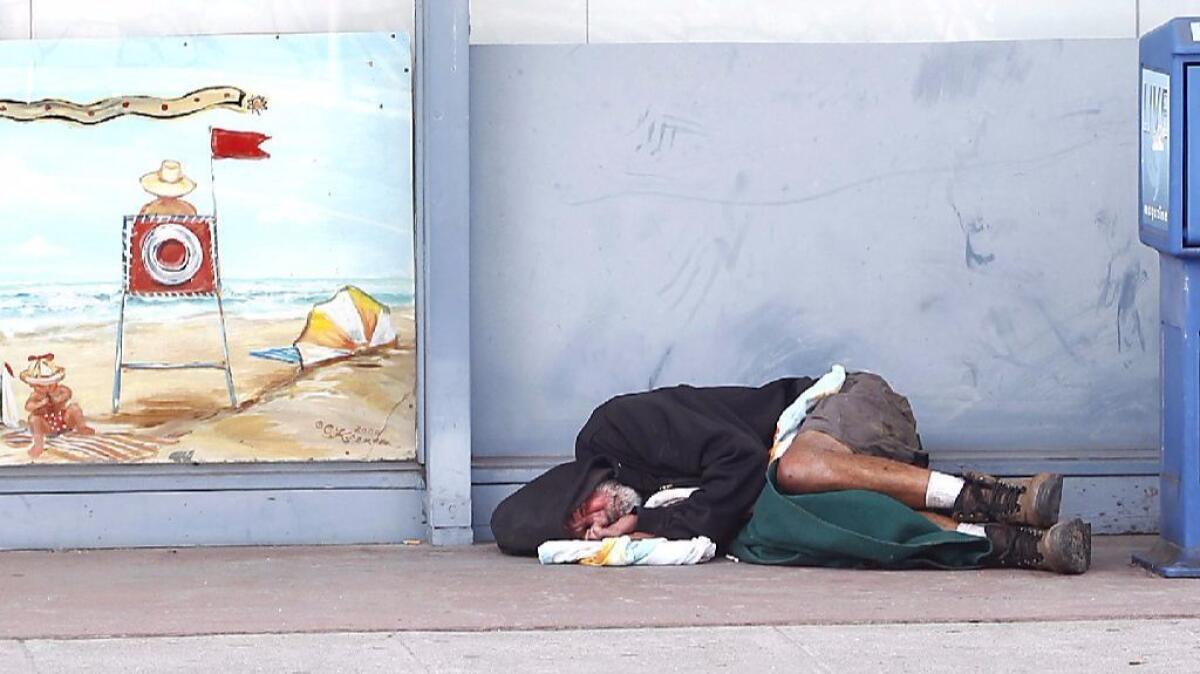Column: ACLU wins at law but loses at diplomacy

Most people in Laguna Beach probably support the ACLU.
The city’s residents are notoriously educated. They bleed blue and donate heavily to liberal causes.
So it’s been difficult to reconcile the ACLU’s recent lawsuit against the city for its handling of the homeless.
The homeless.
The same homeless we deal with every day. The same homeless we feed, clothe and shelter every day.
On June 25, U.S. District Judge Andrew Guilford ruled that the city needs to step up even more. There is an additional trial in August to determine the outcome of other issues.
On the surface, the initial ruling seems reasonable. The judge basically said, if you’re going to serve the disabled homeless, then you should abide by the Americans with Disabilities Act (ADA).
Every business owner knows this.
But it wasn’t so much the technicality of it, but the way in which the ACLU portrayed the city’s policies that rubbed people the wrong way.
On its website, the ACLU said Laguna Beach has “harsh, inadequate policies on homelessness.” It said Laguna’s homeless programs are “ineffective and discriminatory.” It also said “Laguna Beach, one of the most affluent communities in the country, is openly hostile to the plight of its disabled, homeless residents.”
After the ruling, spokesman and attorney David Hernand emphasized the alleged deficiencies.
“Just like when a city operates a school or swimming pool, the ADA and Rehab Act require that a homelessness program must be accessible for the persons with disabilities served,” Hernand said. “We are confident the federal judge hearing this case will agree that Laguna Beach’s Homelessness Program discriminates against individuals with disabilities who are experiencing homelessness and that systemic change is long overdue.”
And it didn’t end there. ACLU analyst Eve Garrow alleged that the city actively tries to harm the disabled.
“The reality is that Laguna Beach has adopted a strategy that punishes disabled individuals merely for falling on hard times,” Garrow said.
For a civil liberties group with such a distinguished history and moral compass, this kind of rhetoric just comes off as petty – and wrong.
Dawn Price is the executive director of the Friendship Shelter. She is at ground zero in this whole debate. It’s her program that runs the Alternative Sleeping Location (ASL). It’s the ASL van that will need to be retrofitted.
Price is a member of the ACLU and long-time advocate for disability rights. She was even a volunteer for Sen. Tom Harkin, the author of the ADA, when he was advancing the idea.
To say she has mixed feelings about the ACLU’s action is an understatement.
“The characterization and language used in the lawsuit to describe our program at the ASL was inaccurate, hurtful and distressing for our staff and the clients we help in that program,” Price said. “I feel strongly that if someone were to read those documents and never visit our program, they would have a vastly inaccurate impression of what is, in reality, a very compassionate, flexible and effective program that housed more than 60 people over the last year.”
The bitter irony here is that Laguna is the only city in Orange County doing this type of good work.
Newport Beach, Laguna Niguel, Coto de Caza … do you think any of them are housing the homeless? No other city in Orange County does what Laguna does.
Despite its faults, Laguna Beach has stepped up consistently. It continues to step up every night and every cold morning.
Even the judge admitted it in his ruling.
“To its credit, Laguna Beach is one of the only cities within Orange County that has a homeless shelter,” he wrote. “Today, the Court applies the law although, ironically, it could ultimately leave homeless folks out in the cold.”
As a city, as a society and culture, we have let legalism establish the dialog.
Is it better to have an ADA-compliant van? Sure. But did we need to go to court over it?
“It’s been our experience at Friendship Shelter that it’s hard to come to productive, creative and effective solutions within the context of legal action,” Price said.
Instead, lawsuits polarize the community, force people into corners and empower those who do not wish to build but destroy.
No permanent supportive housing will get built this way.
No meaningful homeless policies will change.
If anything, I worry about the city of Laguna Beach just throwing up its hands and saying forget it, we’ve tried hard and look where it’s gotten us.
Ship them to Santa Ana.
DAVID HANSEN is a writer and Laguna Beach resident. He can be reached at hansen.dave@gmail.com.
More to Read
Start your day right
Sign up for Essential California for news, features and recommendations from the L.A. Times and beyond in your inbox six days a week.
You may occasionally receive promotional content from the Los Angeles Times.






